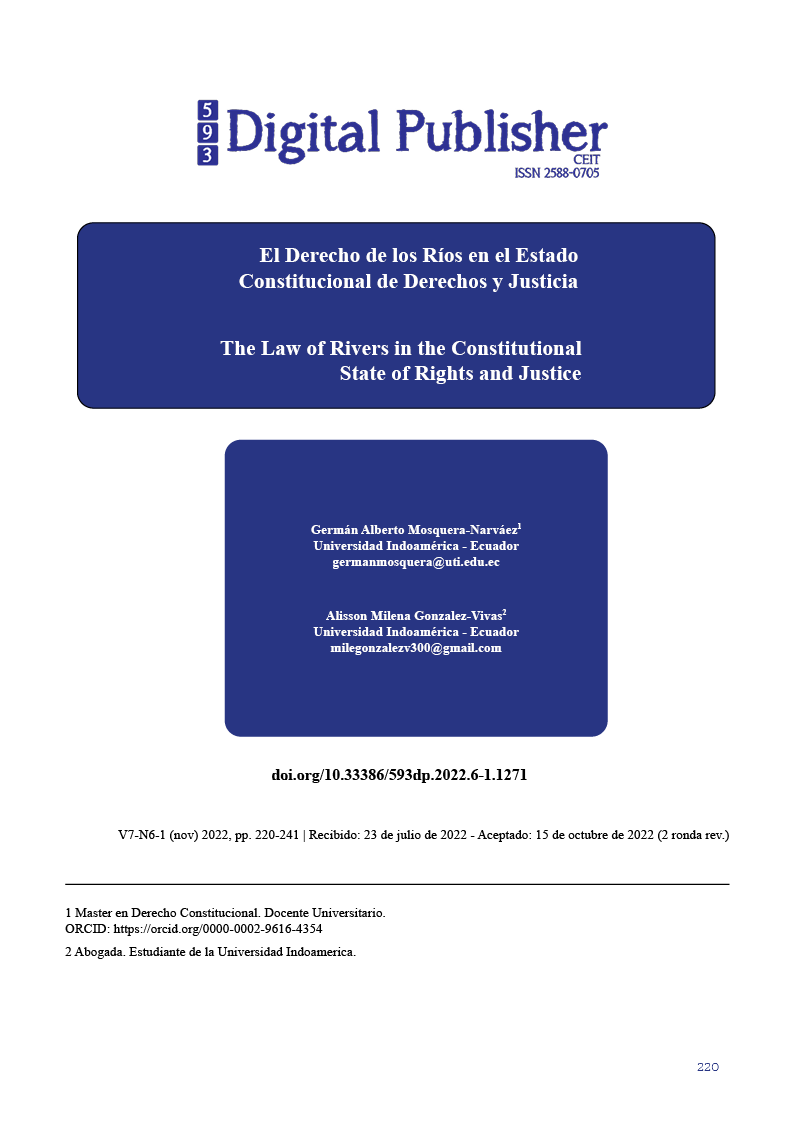The Law of Rivers in the Constitutional State of Rights and Justice
Main Article Content
Abstract
This research article analyzes, through a qualitative critical methodology, judgment No. 32-17-IN/21, issued by the Constitutional Court of Ecuador against the indigenous Sumak Kawsay worldview, within a legal pluralism. The recognition of nature as a subject of rights; this being a great challenge of Andean ecological constitutionalism, characterized by a process of creation and application, within Ecuador, and that marks the emergence of an environmental protection paradigm contrary to the Western one, changing the anthropocentric legal vision to a biocentric approach, based on the balance between nature and humanity. The purpose of our article is to determine the relevance of the criteria of the constitutional court, its scope and application, on the declaration of unconstitutionality of articles 86 and 136 of the Environmental Regulation of Mining Activities (RAAM); these being contrary to the constitutional regulations. By starting from a recognition of rights to non-human entities until now excluded from legal thought, it allows to modify the form of the idea of nature, managing to put the sumak kawsay into practice, promoting equity, social justice, pluralism, and democratization. In addition to leaving behind premises of economic progress on nature as an object, but a coexistence in which diversity is no longer the exception, but the rule. Latin America displays a new conceptualization of the emergence of a global ecological rule of law capable of moving the objectives of sustainable development towards a more holistic dimension, facing future challenges, as well as possible future risks. We use theoretical methods, synthetic analytical, exploratory in scope and descriptive in form with a qualitative approach and non-experimental design.
Downloads
Article Details

This work is licensed under a Creative Commons Attribution-NonCommercial-ShareAlike 4.0 International License.
1. Derechos de autor
Las obras que se publican en 593 Digital Publisher CEIT están sujetas a los siguientes términos:
1.1. 593 Digital Publisher CEIT, conserva los derechos patrimoniales (copyright) de las obras publicadas, favorece y permite la reutilización de las mismas bajo la licencia Licencia Creative Commons 4.0 de Reconocimiento-NoComercial-CompartirIgual 4.0, por lo cual se pueden copiar, usar, difundir, transmitir y exponer públicamente, siempre que:
1.1.a. Se cite la autoría y fuente original de su publicación (revista, editorial, URL).
1.1.b. No se usen para fines comerciales u onerosos.
1.1.c. Se mencione la existencia y especificaciones de esta licencia de uso.
References
Senior Lecturer, Faculty of Law, Victoria University of Wellington. Este escrito fue presentado en el Seminario Internacional Derechos de la Naturaleza: Aplicación y Tendencias, el cual tuvo lugar en Guayaquil, Ecuador, el 11 y 12 de diciembre de 2012.
Néstor Pedro Sagüés, “Justicia Constitucional y control de la ley en América Latina”, en La justicia constitucional en la actualidad, Obra citado, pp. 174.
Expediente 2302-2003-AA/TC, de 13 de abril de 2005, f.j. n° 32
Jorge Zavala Egas, Lecciones de derecho administrativo (Guayaquil: Edilex, 2011), 171. 19 Ecuador, Asamblea Constituyente, Constitución de la República del Ecuador, en Registro Oficial
Simón Acosta, E. (2011). El principio de Legalidad y la Seguridad Jurídica en el ámbito tributario. En I Jornada de Derecho Tributario: Cuestiones actuales de Derecho Tributario (págs. 13 - 72). Lima: Palestra
Báez Moreno, A. (2005). El principio de reserva de ley tributaria y la base imponible del Impuesto sobre sociedades: una reflexión sobre la inconstitucionalidad del artículo 10.3 TRLIS. Revista española de derecho financiero, 851-894
Luciano Parejo Alfonso, Lecciones de derecho administrativo, 4. a ed. (Valencia: Tirant lo Blanch, 2011), 731.
Carbonell, M. (2004). Los derechos fundamentales en México. Universidad Nacional Autónoma de México.
Encalada, A. (2010). Funciones ecosistémicas y diversidad de los ríos: reflexiones sobre el concepto de caudal ecológico y su aplicación en Ecuador (Vol. 2 N°5). Polémika. https://revistas.usfq.edu.ec/index.php/polemika/article/view/370
Ferrajoli, L. (1999). Derechos y garantías: La ley del más débil. Trotta. p.37
Martínez Pujalte, A. L. (1997). La garantía del contenido esencial de los derechos fundamentales. Centro de Estudios Constitucionales.
Pereira Otero, C. A. (2014). Aproximación jurídica al contenido y alcance del núcleo esencial del derecho fundamental a la libertad individual en el constitucionalismo colombiano (Vol. 33 N°67 Julio). Revista Temas Socio Jurídicos. https://revistas.unab.edu.co/index.php/sociojuridico/article/view/2102
Stutzin, G. (1984). Un imperativo ecológico: reconocer los derechos de la naturaleza (Vol. 1). Ambiente y Desarrollo.
Asamblea Constituyente. (2008). Constitución de la Republica del Ecuador. https://www.tce.gob.ec/wp-content/uploads/2022/01/Constitucion-de-la-Republica-del-Ecuador.pdf
Belloso Martín, Nuria. (2017). El neoconstitucionalismo y el nuevo constitucionalismo latinoamericano: ¿dos corrientes llamadas a entenderse? 21-53.
Boff, L. (2013). Constitucionalismos ecológicos en América Latina. 1.
Borràs, S. (2016). New Transitions from Human Rights to the Environment to the Rights of Nature. Transnational Environmental Law, 5(1), 113-143. https://doi.org/10.1017/S204710251500028X
Cesar Montaño Galarza. (2011). El deber de pagar tributos y los principios de legalidad y de reserva de ley en la Constitución del Ecuador de 2008. https://repositorio.uasb.edu.ec/bitstream/10644/3130/1/05-TC-Monta%c3%b1o.pdf
Consejo Económico, y Social, & Carlos Mamani. (2010). Estudio sobre la necesidad de reconocer y respetar los derechos de la Madre Tierra, Foro Permanente para las Cuestiones Indígenas, Consejo Económico y Social de la ONU. https://www.un.org/esa/socdev/unpfii/documents/E.C.19.2010.4%20ES.pdf
Corte Constitucional. (2021). Sentencia 32-17-IN/21. https://www.corteconstitucional.gob.ec/index.php/novedades-jurisprudenciales/item/1113-sentencias-32-17-in-21.html
David Tickner, JEFFREY J. OPPERMAN, ROBIN ABELL, & MIKE ACREMAN. (2020). Bending the Curve of Global Freshwater Biodiversity Loss: An Emergency Recovery Plan. 70. https://watermark.silverchair.com/biaa002.pdf?token=AQECAHi208BE49Ooan9kkhW_Ercy7Dm3ZL_9Cf3qfKAc485ysgAAAs4wggLKBgkqhkiG9w0BBwagggK7MIICtwIBADCCArAGCSqGSIb3DQEHATAeBglghkgBZQMEAS4wEQQMEZfLJBKVbqt2pCvVAgEQgIICgUTqjMMR88NYk308vMIG_f_GSOzhRuGs2_ef_nvXCDk4Ii_AGob2x5kChTLDwVUh_iVpp1zyG24pVmJRSASZZx-d7XhKRXmZnfWvhfRA7eEvUF0SFK8cSuxpPS90AZ1VV6dnOlQlzT98-ka6tEdZKZ4X3EZP9k9W11lIsLvgk-j24o-Yfw-GK_UmccdNCfPqY2KxeKtau4qlVKBjjVs1xfJW0mGdymjgH1ywoj3emfJpZbiQpy659vqyXHGHVjkh8iHrsVYumEmNwJGJGa8ETrMkVJp-nP0y_rMqmgJhb-4VWEz-dWf2LyqHKSPh9CW22oPszFhIRp7JGNULVW7TS9DPgx2WsPRjEovQIWyVHvSMSHjZuu7rES4YMUVM6zsvNQpvzwkGUfLTH-xFw1XJl3F7WhiRYxO1iajxQlKIsNqmOq4REu3RK6quxWGiFifzSt6NxXaEAqtoGrupJ7aBGU6PO_QMQ_p19Xt4yI88dH4msKQnC3OHWwimW7dbyJLOZE4ij4OHEo2F_VX6A7EMXmm_gsASk2URMdh4Iv-8TPXVfFMzqjoT0YQjjcAP1dBEtvFQWDd5OFzMxqHd2aCbRYtgFPDVrWSJcNQtiNiBuy5zPNG0uUJ4uaCyh84RAT0fUmioyHYdgBajXq-zyuKsqixe1XltTMsBFjvHwij_vVvGuykK8Y3Ir0kiSk_bc7De4mUMl817bVv2UUi9XlyFdSyRdAe8v01QtAy913Awuw43DUcFqgSa25LMVMXWJB8EeKjrwAIXofFeBz1GIdbdhgtWm_68wQmxduq3EsleWTOuYe_lyGMDk659ALOst8vpC0vbdLXqa9MrwBH9FXqm7alS
Domingo García Belaúnde. (1980). Derecho procesal constitucional. https://www.marcialpons.es/media/pdf/100832531.pdf
García, M. del P. (Ed.). (2020). Reconocimiento de la naturaleza y de sus componentes como sujetos de derechos (Primera edición). Universidad Externado de Colombia.
JA Amaya. (2015). Control de constitucionalidad " Constitución-Democracia. https://d1wqtxts1xzle7.cloudfront.net/45344840/273829958-Control-de-Constitucionalidad-Libro-with-cover-page-v2.pdf?Expires=1656953630&Signature=eEFkDfxjlbqDBOhnKX08k9HEHtIn-wtL0LoHcqavKj6GDYYn1~b7OMXI~ZoZlYShN~Cfv1ywcCilooYfPOXw7yduk7TfSfnHwgzcYwGo8LDWLgAuwLqjvL8WDlTTxj~-JBQzWlkt34pOJmEUCB0XcF791FowbS537ubwJiTE6wHJ5CvZZlJB1s8NJaa69vlHqxc9N09X9rMXGWcaNBBm0hjH05AfuQbGfQIx8R7lrwQIG26~2iSmOZWwG72jOl58nle-nUNDPlpPK7dwjOIZcsxTabKsetJnLaDCTEaGnf5jjFnirqSThSwG5oBVYsDo8UCFLgQ5sSmRzli5OF5d9g__&Key-Pair-Id=APKAJLOHF5GGSLRBV4ZA
Leff, Enrique. (2010). “Imaginarios Sociales y Sustentabilidad”. Cultura y representaciones sociales. http://www.scielo.org.mx/scielo.php?pid=S2007-81102010000200002&script=sci_arttext
Macías Gómez. (2010). El constitucionalismo ambiental en la nueva Constitución de Ecuador. Un reto a la tradición constitucional. Iuris Dictio, 12(14). https://doi.org/10.18272/iu.v12i14.704
Macpherson, E. J. (2019). Indigenous Water Rights in Law and Regulation: Lessons from Comparative Experience (1.a ed.). Cambridge University Press. https://doi.org/10.1017/9781108611091
Roberto F. Caldas, Eduardo Ferrer Mac-Gregor Poisot, Eduardo Vio Grossi, Humberto Antonio Sierra Porto, Elizabeth Odio Benito, Eugenio Raúl Zaffaroni, & L. Patricio Pazmiño Freire. (2017). Opinión consultiva oc-23/17 de 15 de noviembre de 2017 solicitada por la república de Colombia. https://www.corteidh.or.cr/docs/opiniones/seriea_23_esp.pdf
Scientia ES. (2022). Scientia Es. https://scientiaes.com/nueva-zelanda
Simón Acosta. (2011). El principio de Legalidad y la Seguridad Jurídica en el ámbito tributario, I Jornada de Derecho Tributario. Lima: Palestra Editores.
Zaffaroni, E. R. (2011). La Pachamama y el humano. Ediciones Madres de Plaza de Mayo.



